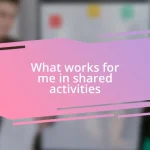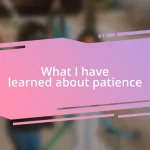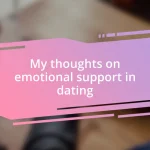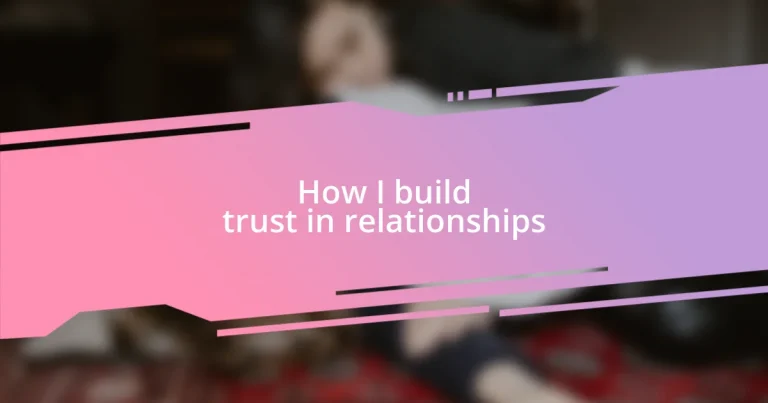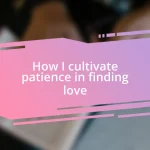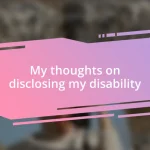Key takeaways:
- Trust is built through vulnerability, consistent actions, and open communication, creating emotional safety and deeper connections.
- Maintaining trust requires accountability, patience, and regular check-ins to reinforce relationships and prevent misunderstandings.
- Shared experiences and mutual support strengthen trust over time, making it an integral part of meaningful relationships.
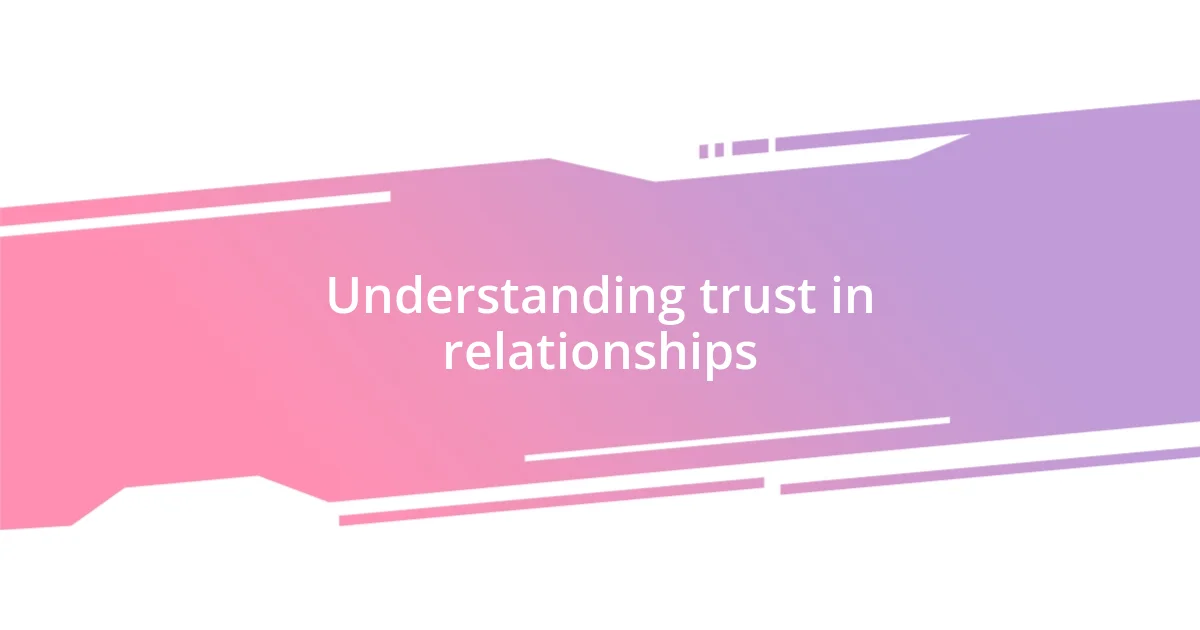
Understanding trust in relationships
Trust in relationships is foundational, yet it can be surprisingly fragile. I remember a time when a small misunderstanding with a close friend shook the very core of our bond. It made me realize that trust isn’t just about the big things; it’s about the everyday interactions that either reinforce or erode that faith in one another.
What makes trust so complex, I often wonder? It seems to stem from vulnerability and the willingness to be open. When I shared my deepest fears with someone I trusted, it felt like stepping off a cliff, but that leap deepened our connection immensely. I learned that trust grows when both parties feel safe to express their true selves without fear of judgment or betrayal.
Building trust also requires consistent actions that align with words. If I say I’m going to be there for a friend, I make it a point to show up, reinforcing that reliability over time. Each commitment met enhances the trust we share, while every broken promise creates cracks that may take longer to mend than I expect. How do you feel when someone lets you down? That’s exactly what helps us recognize the value of being trustworthy ourselves.
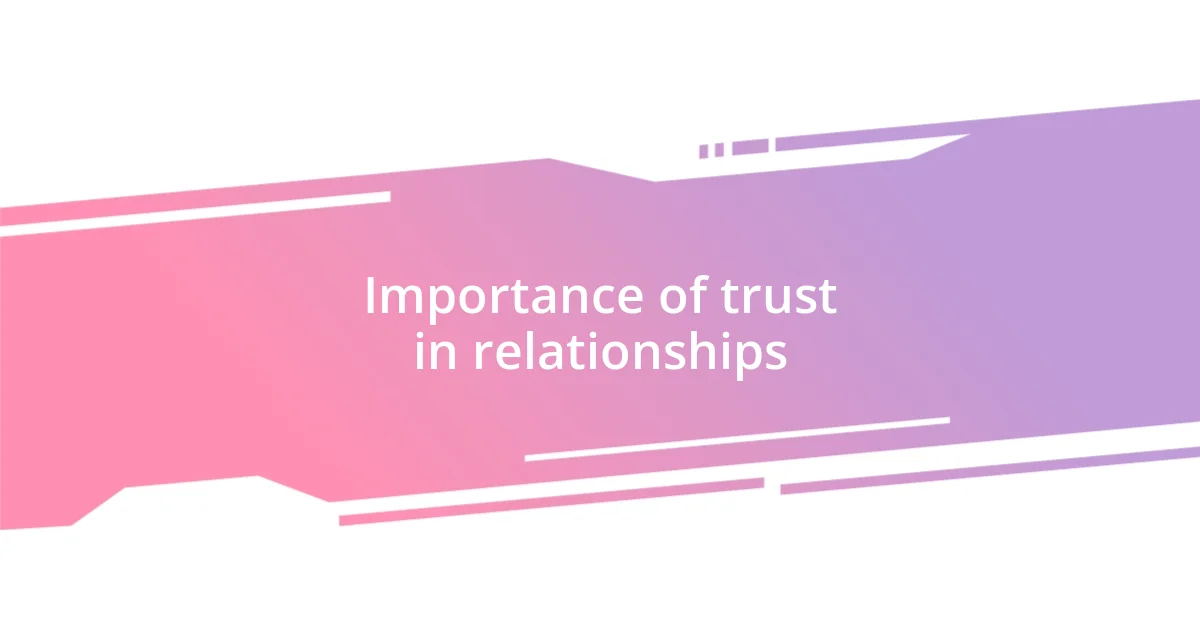
Importance of trust in relationships
Trust acts like the glue that holds relationships together. When I think back on friendships that have meaning, it’s clear to me that without trust, those connections wouldn’t be nearly as strong. I once navigated a rocky patch in my relationship with a family member. The moment we started openly discussing our feelings, rebuilding that trust became a shared priority. This experience taught me that trust doesn’t just make us feel secure; it fosters deeper understanding and empathy.
Here are a few key points about why trust matters:
- Emotional Safety: Trust creates a safe space where both parties can openly share thoughts and feelings without fear.
- Connection Depth: I have found that when trust is strong, relationships flourish, leading to richer shared experiences.
- Conflict Resolution: In my own experiences, trust makes resolving conflicts easier, as both sides believe the other has good intentions.
- Reliability: When I know I can count on someone, it strengthens our bond and enhances overall relationship satisfaction.
- Personal Growth: Trust encourages both individuals to grow, knowing they have each other’s support.
Sharing moments of vulnerability and showing reliability has often been the bedrock of my most treasured relationships. Remember, it’s those little moments of trust and reliability that build the strongest connections over time.
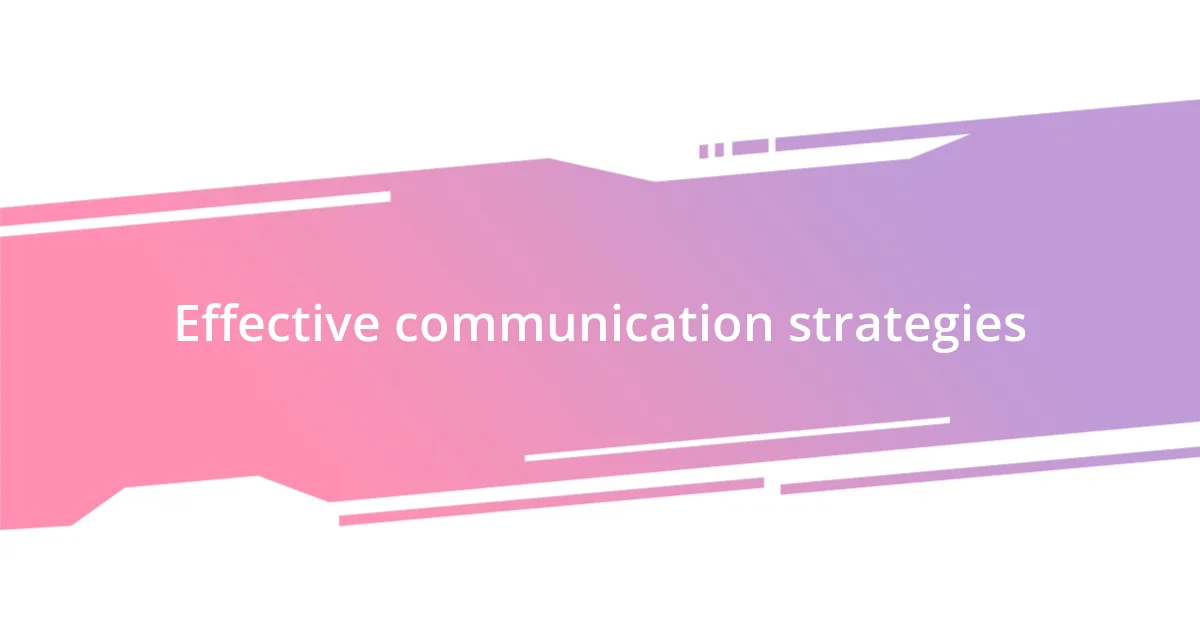
Effective communication strategies
Effective communication is at the core of building trust in any relationship. For me, this means being transparent about my thoughts and feelings. I once had a misunderstanding with my partner that stemmed from my reluctance to express my concerns. Once I opened up, our connection strengthened, illustrating how vulnerability in communication fosters trust. Have you ever hesitated to voice your feelings, only to realize that clarity could have changed the situation for the better?
Active listening is an essential part of effective communication. I recall a time when a friend shared their struggles, and I made a conscious effort to listen without interrupting. By reflecting back what they said, I demonstrated genuine care and understanding, which made them feel valued. This experience reinforced my belief that listening attentively invites openness and builds a strong foundation of trust. When we feel heard, it’s easier to show our true selves.
| Communication Strategy | Description |
|---|---|
| Transparency | Openly sharing thoughts and feelings to avoid misunderstandings. |
| Active Listening | Listening attentively and reflecting on what the other person says. |
| Consistent Check-Ins | Regularly asking about feelings and thoughts to maintain open dialogue. |
| Non-Verbal Communication | Using body language and eye contact to show engagement and interest. |
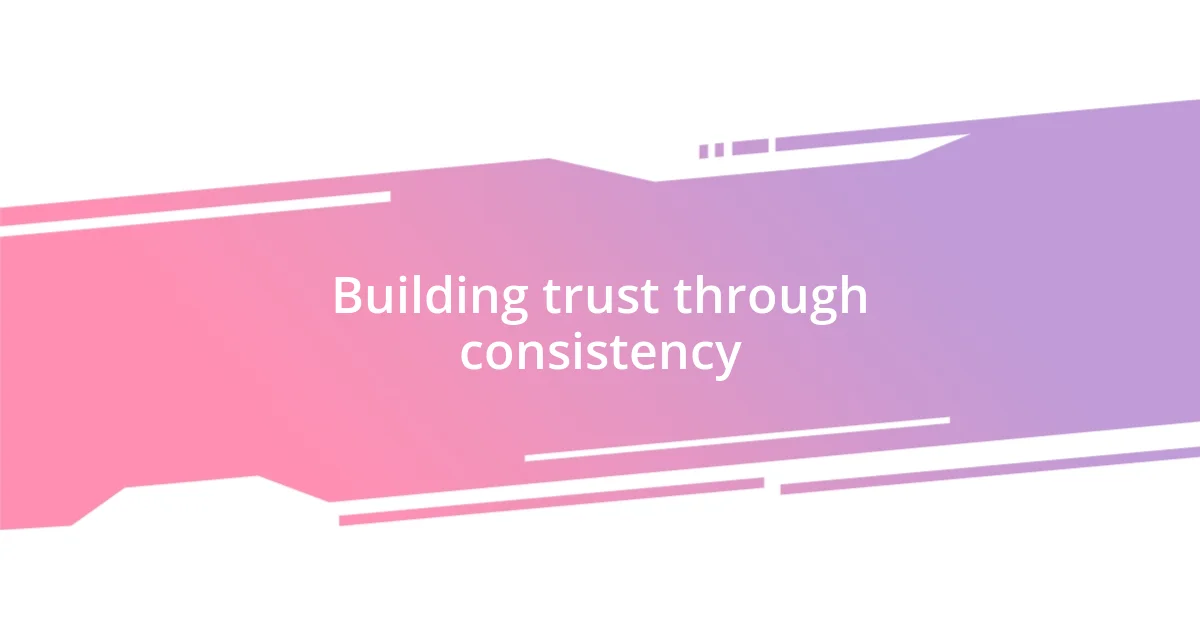
Building trust through consistency
When I think about building trust in relationships, consistency stands out to me as a crucial element. In my own life, I’ve learned that being reliable isn’t just about showing up physically; it’s about being emotionally present, too. For instance, I remember a time when a close friend was going through a tough period. I made it a point to check in every week, not just with a casual “How are you?” but by taking the time to dive deeper. This consistency in my engagement not only reassured her but also solidified our bond.
It’s fascinating how small, consistent actions can lead to profound trust. I often reflect on how I keep promises, no matter how minor they seem. When I commit to something—whether it’s a lunch date or a simple call—I follow through. This practice has taught me that consistency builds a sense of security; my friends and family know they can rely on me. Have you ever noticed how even a single missed promise can ripple through a relationship, leaving doubts and insecurities in its wake?
Moreover, I believe that showing up consistently during significant moments makes a lasting impact. I vividly recall celebrating my sister’s graduation; I made it a priority to be there, cheering her on in every way I could. It wasn’t just about the event itself, but the assurance she felt knowing I would always support her through life’s milestones. Isn’t it amazing how those gestures, big or small, lay the groundwork for a trust that becomes an integral part of our connections?
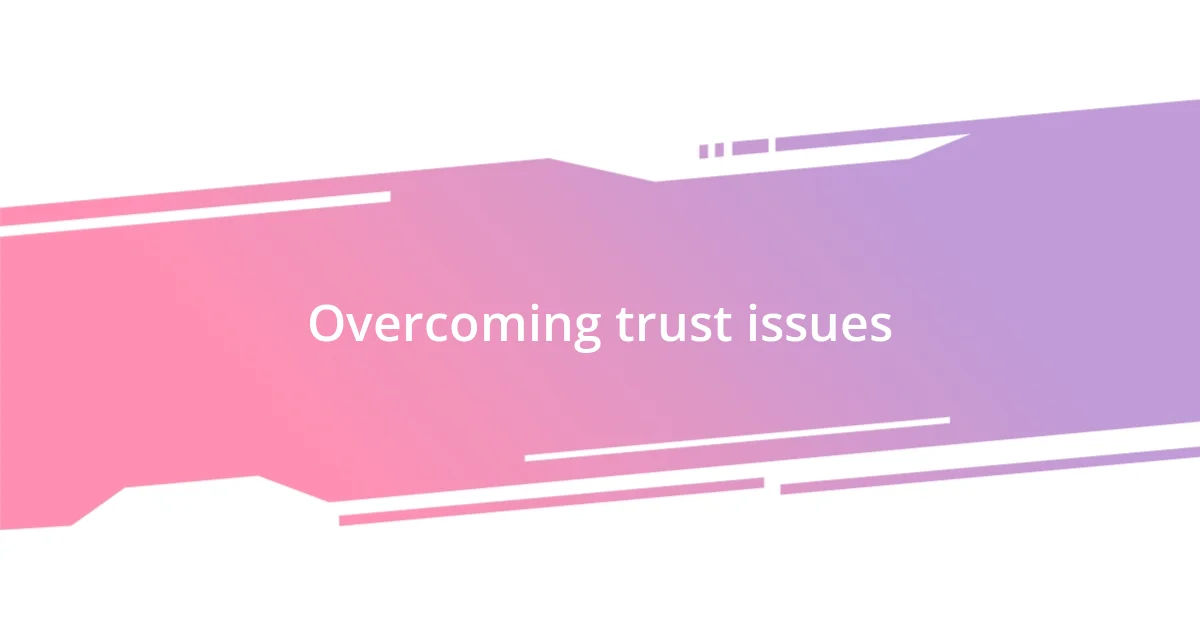
Overcoming trust issues
Overcoming trust issues can be a daunting journey, but I’ve found that acknowledging these challenges is a vital first step. I remember a situation in a past friendship where my trust was shaken. Instead of retreating, I chose to confront my feelings and share my reservations. That openness not only clarified my perspective but encouraged my friend to be equally transparent. Isn’t it interesting how vulnerability can pave the way for deeper connections?
I also believe in the power of patience when addressing trust issues. There was a time when a colleague and I had a rocky start due to misunderstandings and a lack of clear communication. Rather than pushing for immediate resolution, I took the time to build rapport. Gradually, our professional relationship blossomed into a genuine friendship, reminding me that trust often takes time and persistence to cultivate. Have you ever found that a little patience can go a long way in mending broken trust?
Lastly, it’s essential to reflect on past experiences and learn from them. For instance, after being let down in a previous relationship, I made a conscious effort to understand my own trust triggers. I realized that it wasn’t just about the other person’s actions but also about my responses to those actions. By examining my feelings, I not only healed but became more equipped to approach new relationships with a fresh perspective. How often do we overlook our own role in fostering trust?
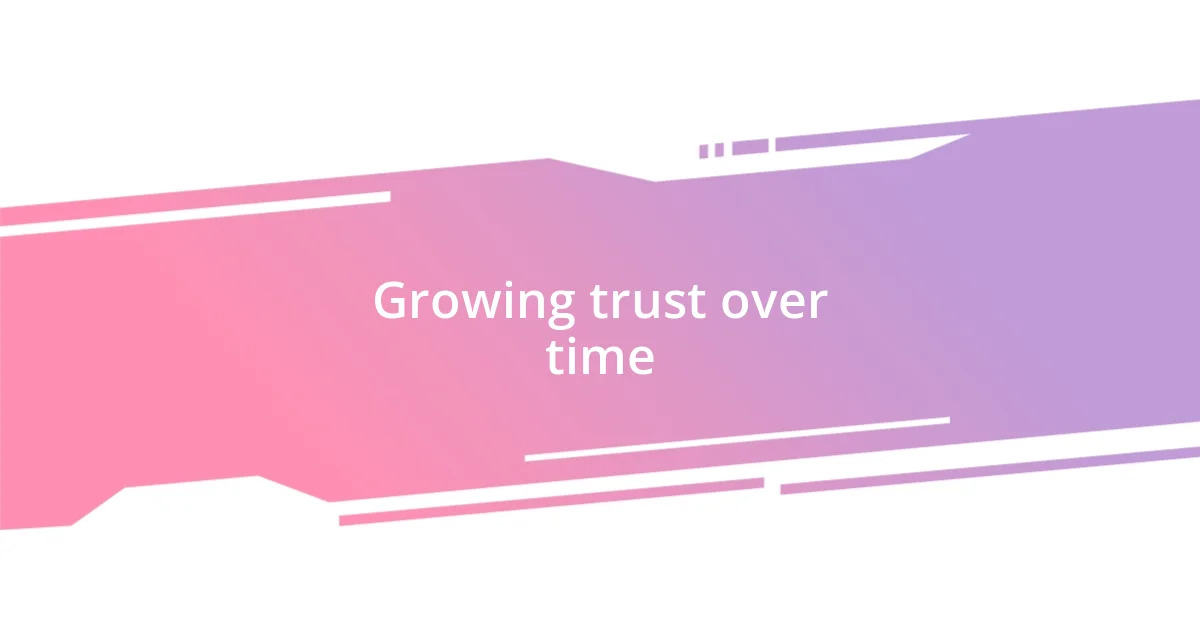
Growing trust over time
Building trust is a gradual process, and I’ve experienced firsthand how meaningful interactions can shape that journey. I recall a friendship that started rocky, marked by misunderstandings. Over time, I made it a priority to share little victories and challenges. By celebrating small successes together, our bond deepened, and I felt the quiet strength of trust growing each day. Isn’t it interesting how recognizing shared experiences can create a solid foundation for trust?
As I’ve navigated different relationships, I’ve noticed that trust flourishes when both parties are willing to be vulnerable. One instance that stands out to me was when a close friend opened up about his struggles with mental health. In sharing my own experiences, it felt like we exchanged a secret key to a deeper level of understanding. This mutual vulnerability created a sanctuary of trust, allowing us to explore our emotions without fear of judgment. Have you ever found that opening up about your struggles leads to a more profound connection?
It’s also worth noting how trust can be reinforced through continuous support. Recently, I attended a friend’s art exhibition, and my presence felt especially important to her. I could see the relief wash over her when she spotted me in the crowd. That moment reminded me that showing unwavering support during pivotal events reminds others that they can lean on us. Isn’t it rewarding to think that our availability and interest can cultivate enduring trust in relationships?
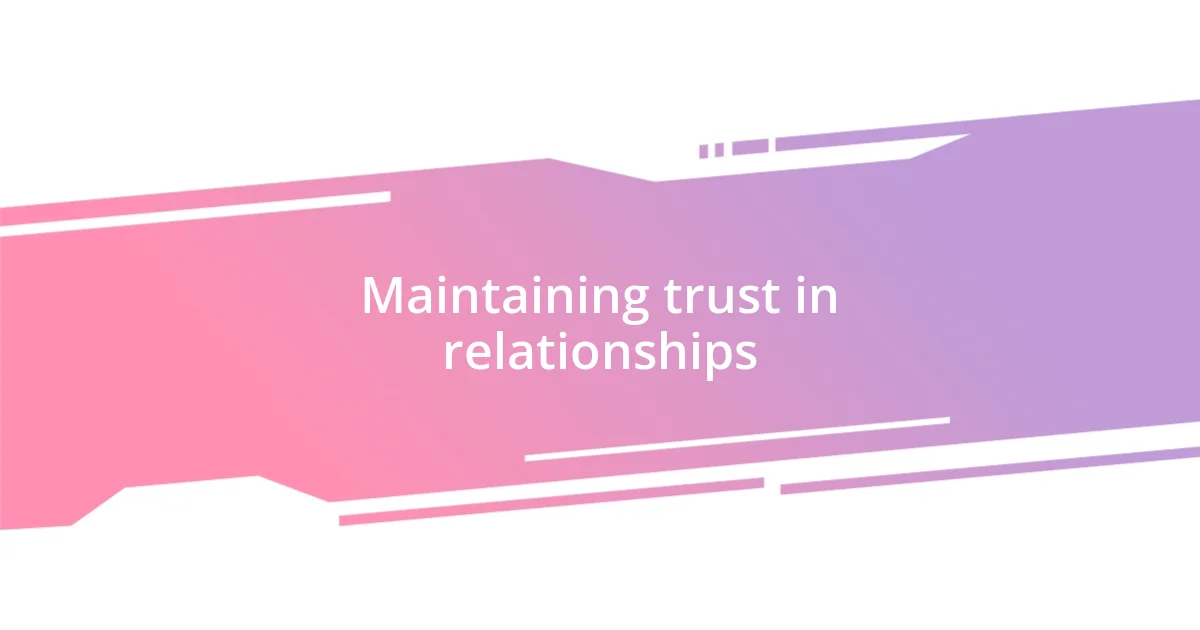
Maintaining trust in relationships
Maintaining trust requires active engagement and consistency over time. I remember a situation with a family member where we faced a misunderstanding that threatened to create a chasm between us. Instead of waiting for the ice to melt on its own, I made an effort to check in regularly and reassure them of my intentions. It’s surprising how such small gestures can reinforce trust; have you experienced something similar in your own relationships?
One crucial aspect I’ve learned is that accountability plays a significant role in sustaining trust. There was a time when I missed a promise to a friend, and instead of glossing over it, I owned up and apologized sincerely. This honesty allowed us to rebuild what was momentarily shaken, proving that taking responsibility can often strengthen rather than weaken bonds. So, isn’t it fascinating how accountability can actually breathe life into a relationship instead of the alternative?
Lastly, continuous communication is vital in maintaining trust. I recall a period when my partner and I faced busy schedules that left us feeling distant. We decided to establish a weekly check-in, just to share what was on our minds. This simple act not only provided us with a sense of connection but also prevented misinterpretations from festering. Have you found that a little structured communication can work wonders in keeping trust alive?

